
she/they, AuDHD, ace, demisexual, fictosexual. JOIN US at Hannibal's Dank Memeory Palace on FB.
223 posts
Latest Posts by youdelight-itolerate - Page 7
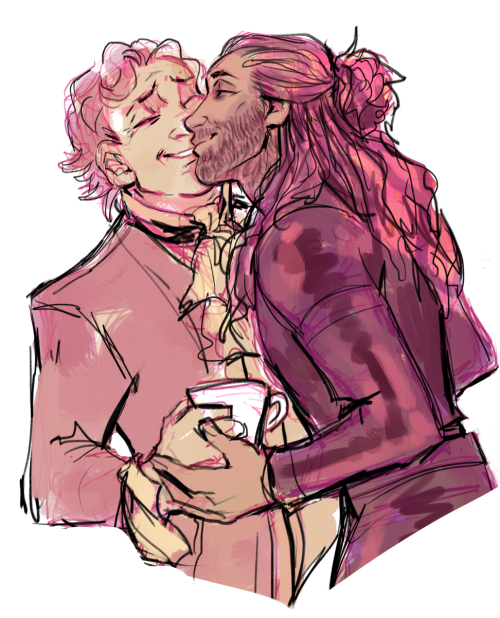
Rubs grease paint all over your fine linens.
Ok it’s late so bear with me as I try to articulate this.
Every day I am thinking about the way Ed says, “Oh shut up” in response to Stede saying, “I’ve only got stupid ideas.”
It’s something about his exasperated tone, his furrowed brows, the way he looks at the ground instead of Stede, how he’s one second away from rolling his eyes. In this moment he is simply a man with his best friend who he is trying to make feel better and the best friend is ruining his attempt. Real “no one is allowed to talk shit about you, not even you” energy.
And obviously Ed is in love with him there but there’s just something very special to me about how even without taking romantic feelings into account, there’s affection and camaraderie there, so much that he feels real annoyance when Stede gets too down on himself. That special type of annoyance, the type that doesn’t spell out abandonment, but rather the type where he wants to shake Stede and say, “see what I see for once, you wonderful idiot.”
To paraphrase a quote from Parks and Rec: he loves him and he likes him.
It is so important to me that he just. Genuinely fucking likes him.





mood… (also can you believe an 18th century pirate invented fanfiction) | OUR FLAG MEANS DEATH

When you’re in full sicko mode and you see your estranged lover from across the raid.
And you’re supposed to be enraged, but your glowing heart eyes betray you.


Does he hold you when you’re crying? Or does he kick you when you’re down?
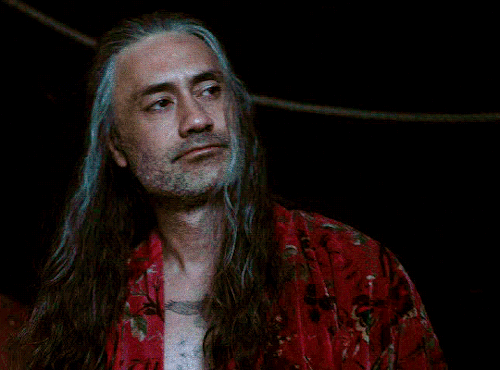
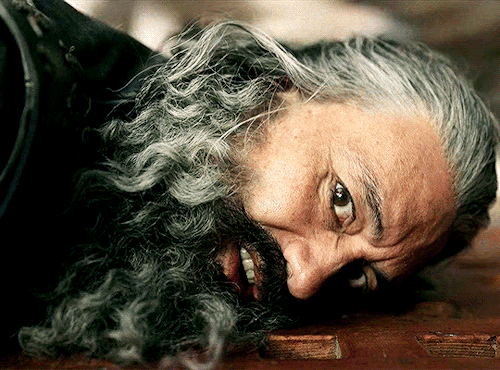
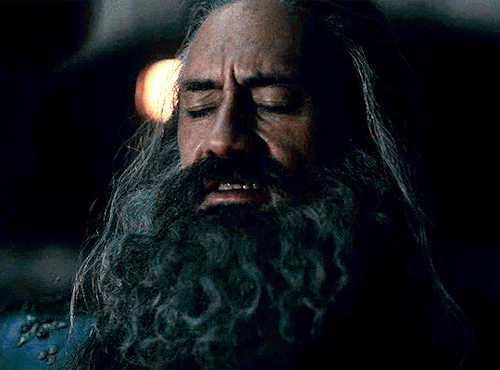
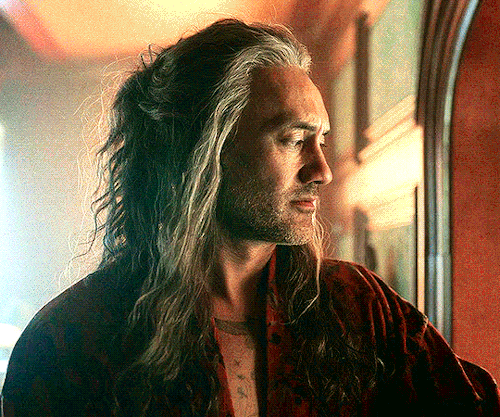


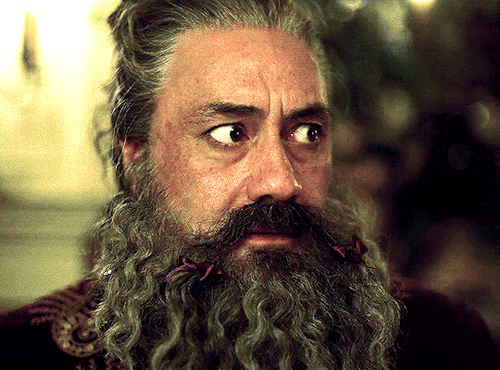
is this about taika’s eyes again? NO! it’s also about his pretty face
me and the wretched bitch i pulled by being the bringer of terror untold










Mary Bonnet + outfits
Okay but we all expect to see Stede dramatically throw himself in front of Ed as someone is pointing a gun at him, right? Then Stede gets shot because he's not Blackbeard, he's a doofus pirate who may or may not have terrible facial hair, and le gasps from all around, right? And we see Ed's face crumple in real time as all the walls fall down in the face of Stede's actual death and the gunshot is so loud and it's still reverberating even though logically it makes no sense, they're not in a cave, but it's the drama, right? This is at least halfway through the season so Ed's already gone thru it, he's done some work on himself so it's not a huge surprise to see him immediately fall to his knees and cradle Stede's body in his arms. He lets out a quiet, pained "Stede?" and Taika deploys his eyes to full effect, we're talking moonlight eyes here.
Then mfing Rhys Darby opens his eyes, pulls a half a petrified orange with a bullet lodged in it out of his coat and goes, "I knew that treasure map was real."
i could rewatch their first real conversation in stede’s cabin all day. it’s the recognition, baby. it’s ed reassuring stede instantly about his crew, ed being careful how he touches stede, ed daring to pick up the cashmere and touch it to his cheek. it’s stede reassuring ed that he’s a good man, stede accepting ed’s interest in the cashmere and realising they have something to share, stede daring again, again, after all the mockery he’s suffered for being himself, to be himself for this guy. this strange good man who is more gentle with stede than anyone has ever been in all his life.
hey, do you wanna do something weird?
they have already done it. it’s been five minutes and they’re in fucking love.
Ed's deranged little "heh yeh 😍" when Stede asks if he's happy now after being stabbed
wheres your whimsy. wheres your fucking whimsy

Find someone who looks at you {redux} (original here)
Reads a fanfic: that was good, I'll leave a kudos
AO3: You have already left kudos here
Me:
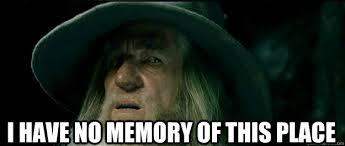
shows + movies that let their characters break down in a visible and ugly and realistic way are the best thing in the world… nothing sucks more than a piece of media that’s so dedicated to having its characters remain Cool that it won’t allow them to show real devastation and emotion outside of Badass Anger and Manly Single Tear
i miss him (fictional character that i can rewatch or reread at any time i want)
Hmm, any one notice this?
So a while ago I wrote a meta about how Stede isn’t actually oblivious to his feelings towards Ed, but I was really thinking about it at work today and honestly… Ed kind of is.

I know the running joke of Stede effortlessly being the most objectively romantic human on planet earth by sheer accident is hilarious. But did you ever notice that when Stede is actually trying to be loving on purpose, Ed Doesn’t Get it?
We can assume Stede started the ritual of them eating breakfast together cause it’s his quarters, and the intimacy of that clearly went right over Ed’s head cause he let Jack invade it without a second thought. Like Ed, honey, did the implications of a man wanting to eat breakfast with you and only you every single day seriously never register to you??
Stede plans a whole day together “treasure hunting” when he wants Ed to stay. The whole “you wear fine things well” business was pure oblivion on Stede’s part, this is him flirting. And he’s trying so hilariously hard to make this ridiculous idea work, but Ed still doesn’t get the gist. Luckily Lucius I-need-a-fucking-raise- Spriggs is here to save the day and clue Ed in to what at least this particular situation means.


…Which makes the gears clearly turning in Ed’s head during this moment absolutely precious and hilarious. Now he knows what’s going on. He sees that Stede’s excited to spend time with him in particular just like Saint Augustine, I mean a bunch more people will be also there this time, but still! And I’m sorry but the brief look of pure “Ed Exe has stopped working” when apparently the first thing Stede could think of was swimming is criminally underrated.

And look at that fond little smile it turns into, Ed knows full well that man has some cute little swim costume squirreled away somewhere ready to go after pulling an entire safari outfit out of his ass last episode 😂
Ok ok enough teasing Ed, back to the point.
We know Ed’s love language is physical touch. Stede’s is less talked about but I firmly believe his is quality time. Just like Ed is touch starved, Stede is shown to desperately want someone to spend time with. But that’s not just the way he receives love, it’s how he gives love too.

His way of saying I love you is to say “That’s me.” He’s the one who breaks the lock on his own bathroom door. He’ll be the one to show up at Ed’s restaurant and look at all the little Knick knacks in his gift shop on a slow day. Stede wants to be the one who’s there, who makes sure Ed doesn’t have to cry by himself, or feel silly about something he loves and put a lot of work into. He doesn’t ever want someone so deeply precious to him feeling as unwanted and isolated as he did back in Barabados.

And Ed ends up missing so many of these intentional gestures. Which isn’t a BAD thing, I just love all the little intricacies of two people with completely different love languages somehow making it work anyway. I think that’s part of why the bathtub scene felt so profoundly intimate, because their love languages work seamlessly together and they end up emotionally on the same page.
An Anti-Colonial Reading of Our Flag Means Death
Our Flag Means Death, is not the first pirate story told in the 1700s, but it is one of the few to take a stark Anti-Colonialism stance throughout its entire first season. As a descendant of indigenous peoples of South America this stood out to me-and I found it extremely pertinent to highlight in an essay. The extent of damage colonialism caused to the indigenous peoples and culture of indigenous America is often underplayed in a general American education, so it is necessary to highlight some of its harm to fully appreciate the show’s efforts.
Starting in the 1400s, Central America and the Caribbean fell under the vicious attack of colonization by many European countries. The indigenous populations of Central America, South America, and the Caribbean became subject to diseases brought on by the colonizers, which triggered a mass genocide amongst indigenous populations. Weakened by disease, it left many indigenous nations subject to the violence and bigotry of colonizers. Indigenous peoples were mass murdered in hordes by colonizers who believed them to be nothing but ‘savages’ in the way of their ‘God ordained’ right to ‘civilize’ the ‘untamed’ world for their individual countries. Those who survived were often subject to slavery, rape, or forceful assimilation. Despite this, many indigenous peoples and nations resisted, and continue with their cultures and nations today in all parts of the Americas. However, colonialism’s wrath did all it could to violently assimilate survivors; forcing the conformation to colonial gender roles and expression, forcing conversion to Catholicism/Christianity, and anything that would help erase indigenous language and customs. It was as much an attempted annihilation of cultures as it was lives. This historical trauma and loss of knowledge is something many indigenous peoples and nations still grapple with today-and continue to push back against when their culture is excluded, appropriated, or mocked.
By the 1700s many European nations were fighting for pieces of the Caribbean and Central America. The African slave trade had begun to further gain control over the land, creating a very similar cycle of trauma and abuse for Africans as the indigenous peoples faced. A loss of lives, autonomy, and culture. This had been going on for over a hundred years by the 1700s, and this century is when you begin to see some of the largest, and most well-known slave revolts as it went on. The 1700s began as a time Europe had established many colonies, and those who had been most oppressed (Indigenous peoples, Africans, etc) and those realizing this promise of glory and ‘new world’ was all a lie (Poor Europeans who came to the colonies for a ‘new life’) were beginning to question the system in greater and greater numbers. White supremacy culture (which is nicely summarized in this graphic:) was the enforced norm by European systems of policing, be it navy, soldiers, etc. European navies sailed the waters searching for more land and resources they could claim as their own, and enforcing the colonial cultures that had been forcefully installed by the original colonizers. They helped shape what was expected in colonial culture, which included oppressing women and people of color, stigmatizing sexuality outside of procreation, demonizing same-sex relationships, and stressing the meaning of life is serving religious values to be worthy of an afterlife in Heaven.

When I speak of ‘colonial masculinity’ I’m referring to the concepts valued of: individualism, violence is power, power is owning/dominating others, emotions are weak, and so on characteristics of white, militant, masculinity. When I speak of White Culture in this essay I’m referring to many of the traits highlighted above, but especially the Christian/Catholic, individualistic, patriarchal system, and the gender roles forced along with it.
Enter pirates. While many historical pirates very much played into the colonial system, continuing patriarchal violence, or profiting off the slave trade- others became a counter-culture (all be it violent) of resistance to the oppressive forces of the enforced colonial culture. Pirating was a space where those who had been deemed powerless or lesser in the colonial hierarchy could potentially reclaim some of that power.
Unlike other pirate media, which either somehow allies Pirates with the navy forces (The Pirates of the Caribbean franchise) or softens pirates’ violence and deviance to make them more generally palatable (they’re just ‘misunderstood’ or ‘sailing around doing nothing’), or just simply casts pirates as the villains- OFMD makes it clear from the get-go-you are meant to root for these pirates, they’re violent, and they are specifically violent and against the colonizing forces. Our pirates are the protagonists, and the group to empathize with-and we should especially cheer on their violence against the policing systems of colonizing nations.
The show makes its stance explicitly clear starting in Episode 1. When the English Navy come upon the crew of the Revenge, they’re painted like vicious bullies-forcing the crew of color to pretend to be in servant roles, and subject to their strings of racist remarks and microaggressions. Even our protagonist, Stede, who has been the most privileged and out of place on the ship so far, is subject to bullying and microaggressions for his overt lack of colonial masculinity and queerness. Until the English arrived, the ship was a place of expression, feelings, and camaraderie for the crew. While many were uncomfortable with Stede’s privilege (and lack of skills putting them in danger) and planning mutiny, others such as Oluwande were able to point out it was better than the colonial alternative like the officers who board the ship.
Before the arrival of the English officers, the only piracy we see the Revenge crew do is against a pair of fisherman-it’s played up for comedy how pathetic of a ‘raid’ this is-but it’s also worth highlighting none of them desire or attempt any violence against the fishermen. However once the English officers go too far with a racist comment-all chaos breaks loose on the ship and we see the first violent acts. Violence is celebrated via comedy against the officers (a knife in his hand!) and unlike Stede’s anxiety toward violence previously, we’re meant to cheer on this violence like our favorite sports team is winning. The show tells us from the beginning: colonizers, specifically colonial policing forces are the enemies here, and we should not pity them, and violence is needed to stop their harm.
All violence toward colonial officers is scripted as comedy. Colonizers/Police forces are written with an arrogance and entitlement, showcasing how accustomed those with top privilege are to having it-and how reluctant they are to consider giving it up. Whether they’re English, Spanish, Dutch, French, so on, colonizers do not get a pass in OFMD. Nor do they get sympathy or backstory. This is a huge contrast between how we’re meant to view violence against the pirates (Stede getting stabbed, the crew being forcefully tied down to “The Chain” in episode 8) which often begs our sympathy or concern. The show knows who is marginalized and who isn’t. Even though Stede reacts with anxiety to killing the Badmintons, the show takes time to make sure he explicitly states he doesn’t actually feel bad about killing him in particular, because he recognizes what a horrible human being he was:

And his only guilt, is getting over the idea he is allowed to resist and fight back against the violent system he was raised to support and over-value, whether it is walking away (From his arranged wife and children) or stopping the colonial violence by any means needed (I.e. striking Badminton when he draws his sword in plans to attack Stede’s crew).
All other characters, whether they are serving as antagonists or not, are given a degree of sympathy/humor even if they’ve committed dubious acts, until they align with colonial militant force. Izzy Hands consistently provokes and antagonizes Stede (And at times Ed) but it’s not until he sells them all out to the English navy Ed punches him across the face and we’ve meant to root for it. Geraldo is the same-once he sells the crew out to the Spanish-he’s shot with no drama by Spanish Jackie herself. Jackie, despite being a force against Jim and Stede at different points, is continuously framed as powerful, interesting, and funny though-because she never aligns with the colonial military and expresses disdain when they enter her bar. Even Calico Jack doesn’t meet his hilarious end until we learn he is complying with Izzy to sell Stede and crew out to the British navy. Once you have aligned yourself with the colonizer in OFMD, your humanity is gone, which is an apt metaphor for the mentality of colonialism that dehumanizes all they conquer.
The first moment I realized OFMD was a show that rebels against traditional colonial culture, was when we are introduced to the indigenous group in episode 2. Many pirate media pieces have featured run ins with indigenous groups-notably and recently this happened in the second “Pirates of the Caribbean” films; In an overtly racist sequence which drags on, an indigenous group is displayed as hyper-violent, cannibals, going on in a made-up language meant to other them and ‘intimidate’ the audience. They also exalt a random white man, Jack Sparrow, as their ‘King’ as well, a showcase of white superiority in the writing as well. The indigenous peoples in this film are intensely racist caricatures, that feel straight out of a 1940s Hollywood film as opposed to one made in 2006 (which highlights just how mistreated indigenous groups are in Hollywood to this day).
(I previously had an image of such scene, but I decided not to subject everyone to the racist imagery but I urge folks to revisit the scene if their memory is hazy to seen the extent of the harm)
The way the indigenous nation is depicted in OFMD feels almost like a direct response to that racism. When their English officer captives go missing, Stede and Pete have dramatic and microaggressive reactions instantly assuming the group are cannibals-only to have it pointed it out the captives are alive and well in a cage nearby. Rightfully so, they’re immediately called out for behaving racistly with the line “Fucking racist”. Further humanity is showcased as Oluwande walks up to the guard holding a drink he was given, as it is made clear the only reason Stede and Pete were caged is because they’re white-and therefore could be colonizers-which have previously attacked the group. The Chief does not shy away from describing the violence previously done to them by colonizers and therefore their reasoning of who they choose to capture vs who they welcome into their homes.

The indigenous group are also shown as very emotionally intelligent, an older man providing Stede ‘therapy’ after his PTSD episode during their trial. It’s a direct example of counterculture and anti-colonial masculinity, which respects and allows emotional vulnerability vs the colonial society where breakdowns, especially from men, would be met with mocking. Once the chief establishes Stede and Pete have no intention to colonize or attack the group-they’re treated kindly and released. The only kind of ‘violence’ shown by the indigenous group-is the selling of the colonizer hostages to Izzy and his crew-the same thing Stede and crew were going to do. Once again showcasing-colonizers are the only disposable targets in OFMD. Indigenous peoples are treated with humanity, humor, and agency in OFMD, not forced into the ‘stoic native’ or ‘viscous savage’ stereotypes as in previous pirate medias. Which leads us to the show’s most important indigenous representation: Edward Teach.
While Edward’s indigenous identity isn’t explicitly stated within the dialogue of the show, it’s showcased in flashbacks his mother is an indigenous woman and many of his mannerisms and words seem to harken back to that identity. It can’t be understated how groundbreaking it is to have an indigenous actor (The multi-talented Taika Waititi) get to play a queer leading role and romance, where none of his character arch surrounds previous indigenous stereotypes on screen. It seems many conscious choices were put into the writing that still honor this representation and Waititi’s identity.
Firstly, being the way Edward talks about colonial religions. One of his first lines in episode four he remarks how the Spanish officers die with “Lots of blubbering for their God”, noting the Catholicism associated with, and used via colonization by the Spanish. It’s significant Edwards says ‘their’ making it clear to the audience he doesn’t subscribe to the same version of a higher power or faith. It’s likely this is a conscious choice of resistance on his part, because in the next episode during a flashback Edward’s mother tells him “It’s God’s Choice” that they are poor, suffering, and subject to his seemingly alcoholic white father. Meaning at some point in his life he chose to reject that ideology handed down to him by colonization.

Edward spaces himself from the idea of a God again in episode 6, warning the Revenge Crew “Be careful what you ask your God for, she might just answer” again denoting he apparently does not believe in any sort of monotheistic God-or at least not one from the colonial sense. His mention of a ‘she’ when referring to God is also a contrast to colonial patriarchal Christianity/Catholicism where God is always described as masculine. It could be insight that perhaps his measure faith has something to do with a divine feminine, or that he simply does not feel the need to honor any structured religion, perhaps we’ll learn more in season 2-either way it is clear Edward has fully rejected colonial religion that was forced on indigenous peoples.
While we’re given no definitive answer on Edward’s particular faith, we are shown organized religion is often an oppressive force (as it was used to convert indigenous peoples via colonization)-not an inspiring one as is often the case in other forms of media. Jim’s Nana prescribes ‘life is pain’ from the Catholic dogma, and Mary reminds Stede it is because of their ‘vow before God’ they must remain in their unhappy, forced, marriage to one another (much like Edward’s mother is implied to have believed). OFMD showcases colonial religion, when used to restrict a person’s autonomy, can be a tool of a violence.

Edward’s disdain and confusion toward ‘passive aggression’ while shown for humor, is very significant in Episode 5 which highlights the upper class’s racism. As per the “White Culture” chart passive aggression goes very hand in hand with white culture, as it goes along with ‘preserving harmony’ and ‘fearing open conflict or emotionality’, vs directly confronting other people about their behavior or being open with one’s emotions regarding how they feel in different situations. It’s often why many groups of colors get stereotyped as ‘overemotional’ or ‘fiery’, i.e. Latine/x people-because the culture is more prided on open expression. OFMD does a clever thing calling out one of the more insidious pieces of white culture by zoning in on passive aggressive, because it can also be a tool used to horde power-when disdain is enforced, but never stated openly making it difficult to challenge those in power. Edward's story seems to highlight much of his piracy has intersected with his overt resistance to colonialism, especially when we learn his first act of violence was against his white, abusive father. The scene is one of intense trauma for Edward, but also explicitly shows the audience Edward has done everything he can to shake off the shackles of colonial force within him, and around him-even if it means severing himself from his own family (at least the white side) to escape the abuse.
Much of Edward’s aesthetics and behavior also align with indigenous cultures and customs. Despite mastering pirate masculinity via intimidation and violence-he does not at all seem preoccupied with mastering colonial masculinity, at times letting himself be flamboyant, loud, expressive, playful, and absurd (something Izzy attempts to police him on stating ‘man’s half insane’). It’s clear he has on eyeliner in many scenes (something many men used historically to keep the sun out of eyes), and enjoys dressing up in finery like Stede for the fancy party. There was a clear care in the writer’s room toward his indigenous identity as well-since even when Edward has his beard cut in the military school scene-his hair is left untouched. In many indigenous cultures long hair was typical for men, and in many acts of forced assimilation, cutting their hair was one of the first things done to strip them of their culture. It filled me with so much joy to see Edward’s hair was never cut throughout the series, or treated as a purely ‘colonial feminine’ trait (especially since in the 1700s many men wore their hair long).


Nor is his wearing a colorful robe or singing-until Izzy intervenes in the middle of episode 10. It is inherently queer-because queerness is inherently anti-colonial, but the show expresses that queerness without forcing any character’s behaviors to be dubbed masculine or feminine (as colonial binary would prefer)-they simply just are. Once Izzy acts an enforcer of colonial gender and behavior on Ed (mocking his wearing a silk robe and openly pining for Stede) -he too is treated with the same pitiless violence as other colonizers in the series were by having his toe cut off (after also threatening Edward as well for his lack of Izzy's approved masculinity). OFMD makes it clear, crime and violence can be appropriate when to stop the violence that would eradicate the lives of those who do not conform to colonial systems.
Ed’s, and by extension the rest of the show’s romantic queerness is inherently anti-colonial as well. As the show creators have highlighted, what is special about OFMD is no one has to have a ‘coming out’ moment, or suffer purely because of their queerness. Queerness is as natural as breathing while at sea in OFMD. This aligns with many pre-colonial cultures, where queerness was wholly accepted as a non-issue, and just as normative as heterosexuality. At sea it seems, characters do not need to worry if their desires will be rejected by anyone being exclusively heterosexual. As Taika Waititi put it recently in an interview, everyone on the show is “somewhere on the gay spectrum”. Despite being the most feared and respected as pinnacle of ‘pirate masculinity’ Blackbeard is, that does not at all conflict with his inherent queerness in his presentation and desire toward Stede.
The relationships in the show are not bound by rigid systems as demanded in colonial society. Lucius and Pete are shown having a sexual relationship before ever declaring any sort of affectionate feelings for one another-something frowned upon in colonial society which urges people to follow the steps of ‘courtship, marriage, sexual relations, family’. Colonialism brought a specific prudery and fear of sexuality, so a space where it is openly celebrated is an act of resistance. Lucius has a victory over Izzy when he retorts “We don’t own each other” after Izzy threatens to tell Pete of Lucius’ other erotic escapades on the ship. This ease with an unstructured relationship is extremely resistant and contrasted to the structured expectations of romance on land. The same can be said for Spanish Jakie’s running joke of having 20 husbands. Jim and Oluwande have a similar contrast displayed, with Jim’s Nana lightly asking if they were married or ‘living in sin’. Indeed marriage is never discussed or passed as a concern between the two of them when they finally kiss and consummate their relationship having sex the first time on screen. Sex is not stigmatized on “The Revenge”-and anyone who attempts to make it so (Izzy) is laughed off immediately.
Edward and Stede’s relationship is obviously queer, between two men, but their age and status in the relationship happening outside of colonial society add another level of queerness to it. Colonial society set up marriage as an institution regarding the preservation of wealth. That is specifically, as Stede’s Father points out, the transference of goods and security of land staying within families (“Mary has acreage”). Even more specifically, about men owning women, after literally paying for them (a dowry) to produce heirs. OFMD makes it a point to highlight how miserable that form of marriage is, and how limiting it is to all peoples’ happiness (even presumably straight individuals like Mary, who is only happy when she is able to carve out her own romance outside the institution of marriage). Additionally, colonialism often asserted the goal of marriage was parenthood, and parenthood the form of life’s ultimate happiness. It’s remarkable to see with Stede, a positive example of someone realizing parenthood is not their life’s goal, or something he is destined to inherently cherish. By the end of episode 10 his leaving is framed as positive, with his children much closer and connected to Mary’s chosen love Doug, as opposed to Stede.
In contrast to Stede’s forced colonial role as a husband and father-his relationship with Edward is entirely based on the premise of their growing friendship and romantic attraction to one another. The pair become a couple completely outside of this system-not for the sake of ‘finding someone to marry’ or ‘procreate’ but solely because they fall in love with one another. And it is a love found later in life, as opposed to rushed into via youth like many young people are forced into or feel compelled to do without being fully formed individuals yet. Edward and Stede do not have anything to gain from one another when they culminate their relationship in a kiss, both being stripped of their pirating and societal privileges at the school. Their relationship forms on the sole basis of wanting to spend time together in their absurd world, bound by their own games and rules, no matter where they are. It’s a radical contrast to most love stories on screen, which usually involve young, white, heterosexual couples, who culminate their love by eventually starting families. For Edward and Stede, the culmination is each other-and the adventure they can share, unbound by any system.

Even the way the colonial forces are defeated when it seems there is no escape, is based on values rejected by white colonial culture. By the end of the season, despite the rocky foundation the Revenge crew began on-they save Stede as a crew. Unlike many other stories with a lone 'hero' who resolves the climax or main antagonist of the story, the English are ultimately resisted because of the crew all chiming in about acts of piracy committed together to save Stede. This directly opposed the foundation of individualism so highlighted in a colonial white mindset as well. Community and found family is what ultimately saves the day.

Stede's 'happy ending' in season 1, is completely abandoning the colonial system that both gave him monetary power-but repressed and exploited his queerness. One can assume his family is some sort of 'newer' money within the show's universe (unlike historical IRL Stede Bonnet) since we see his father doing manual labor and berating Stede that he will get to inherit money as opposed to presumably work for it as his Father did. Despite being born into what should be a system of power a white man, Stede shows demands of colonial culture are too high if one is queer, facing abuse at home and school for it. In episode 10 he severs himself from the abuse of colonialism and is own complacency in it, to fully commit to his counter-culture lifestyle as a pirate-and his queer existence and love. Stede is the audience's POV, because he spends the season straddling the middle, does he continue to uphold and feel guilty about a system that hurt him, but did empower him? Or does he cast off that wealth which came from an abusive system and commit to uncertainty and potential powerlessness for true authenticity? In the end Stede makes the choice we hope he would-'killing' his old self bound to colonial systems and ready to live a life of resistance where his queerness will not lead to the same kind of abuse he suffered.
OFMD frames piracy as a resistant force to the colonial system of the 1700s, and through that resistance a thriving space outside of society where true love and joy can bloom in authentic ways. Crime is seen as positive-and needed- when it is against the colonial or policing system because it rebalances the scales from all colonialism oppressed. What is novel about OFMD is it is not marginalized characters overcoming the odds of their marginalization, it is showing abandoning the world that is built on colonialism can be the path to freedom. It is not queer characters doing their best to blend into, assimilate, and seek acceptance in a hetero-patriarchal colonial world-it is queer characters giving the middle finger to that world and creating their own. It is indigenous characters thriving despite the forces of colonialism. And for one of the first times-their world is shown in bright joy, as opposed to constant struggle. Previous medias showcasing the communities of the marginalized often highlight the some of the true struggle that go on in within those communities due the systemic oppression they've faced-but that representation *only* showcasing struggle can add to the continuous feeling of depression amongst marginalized individuals. Showing those struggles openly-with the genre of comedy-drama, gives hope and resistance to the most marginalized.
OFMD imagines the counterculture to the colonial world as vibrant, communal, and full of laughter-a truly rebellious act to show that choice as joyful as opposed to only full of struggle. It is a radical suggestion from OFMD, that by creating your own structures, communities, and norms, those who have been most repressed and oppressed under the legacies of these systems can find true freedom and joy-and most importantly begin to dismantle the power of colonialism. And perhaps most importantly, OFMD declares, fuck colonialism, and use whatever resistance is needed to stop those who uphold it and its values.

I'm very excited to see what David Jenkins and his incredible diverse writing crew have in store for season 2.
I am uneasy and unsettling and unapproachable (three superpowers)


almond blossom ♢ our flag means death
Some point next season Ed’s gonna wake up next to Stede in his little nightcap with his stupid lil sleep mask on and be like This Is the Pinnacle of Beauty
there needs to be more fic that plays with how ed is a stone cold genius and good at everything and that's part of why he's so fucking bored.
his response to stede saying he could open a restaurant says it all.
"probably could. maybe i will. i can do anything."
and he can!!!
when stede's like OH COME ON at ed demurring and then suddenly playing the piano! bcs oh ofc he can also play piano! (he has a harpsichord AND a lute AND an accordion in his room on the queen anne! consider: ed lowkey a musical prodigy)
when izzy gets frustrated in the art of fuckery and exclaims that ed just knows everything about everything in the whole fucking world! he thinks ed's a know-it-all because ed's so damn effortlessly good at everything! (his smug look at izzy when he's about to explain the fog and whatnot in 1x04!)
he asks stede how to "win this interaction" at the french party because that's what ed does. all he does is WIN WIN WIN. and that in turn is part of why it's so devastating to him when he's mocked. not just the trauma he's carrying around about class and self-worth, but also because it's probably the first time ed has failed at anything in a very long time!
a lot of au fic especially focuses in hard on the fact that ed admires and longs for stede's ability to express himself through things like fashion and to luxuriate and pamper himself and has felt barred from this by class distinctions and performing a particular kind of masculinity. but in the course of it, they entirely lose that ed is legendarily famous, wildly successful, and extremely rich!
while stede obviously holds various structural privileges over ed, in the immediate world that they inhabit ed is the one with the power and the clout and his interest in stede is what's considered a weird foible, ed taking a pet, etc.
stede has own way of doing things and money. ed has notoriety, skill, respect AND his own way of doing things and money.
he's bored and depressed BECAUSE he has it all and has done it all. if you strip that away then the entire point of his character flies right by.
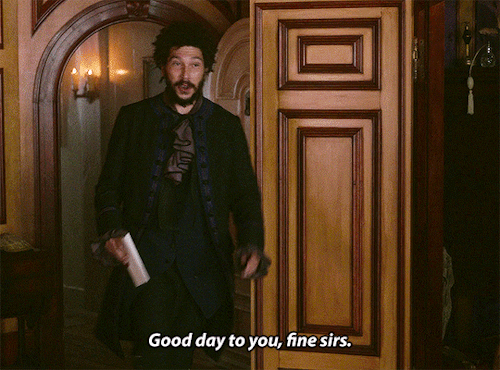


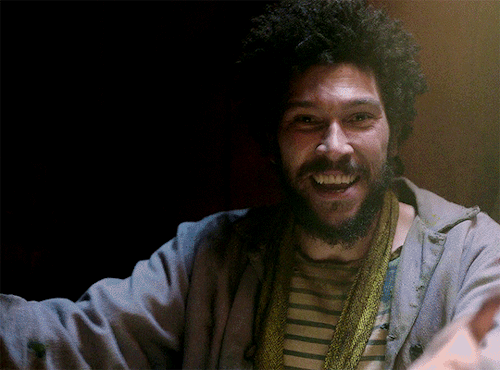
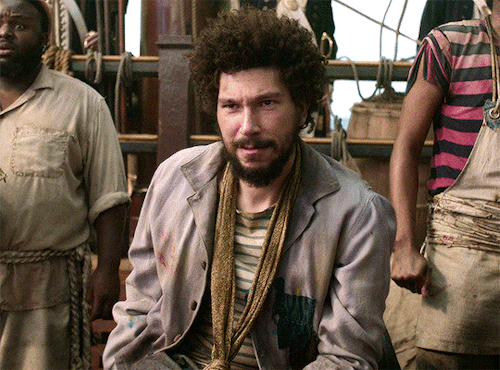
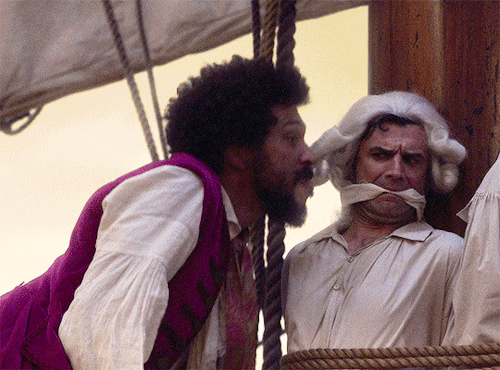
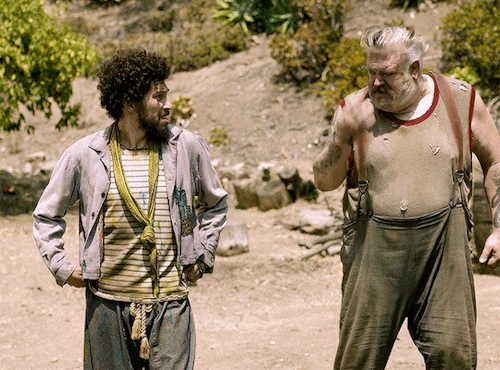
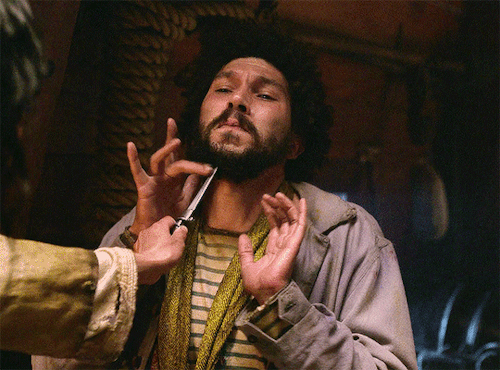
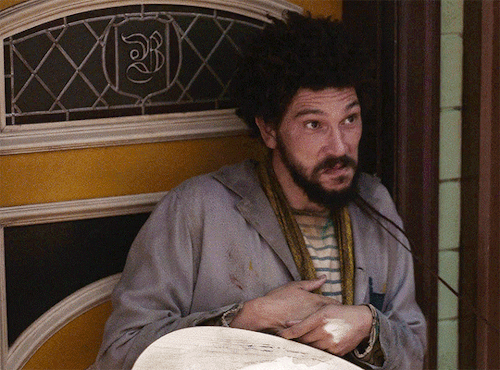
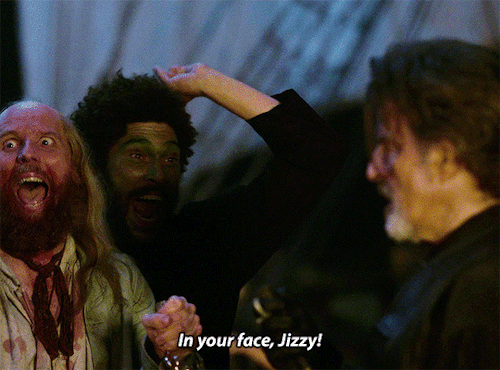
joel fry as frenchie in our flag means death season one
i enjoy izzy hands and con o’neill just as much as everyone else but there is one thing that’s bothering me that people seem to be forgetting.
izzy may call him ed or edward, but he doesn’t know edward. he only knows the blackbeard persona. he doesn’t love edward, the scared boy who grew up in an abusive home and fancies a fine fabric. he doesn’t love ed as he wants to be, gentle and wearing silk and building blanket forts. he loves edward as he wants him to be; the dread pirate blackbeard.
y’all need to get it thru ur heads that izzy is bad for edward. does this mean he’s doing it with malicious intent? of course not. i do think he genuinely loves the version of edward in his head, but the fact is that that is not the person edward wants to be.
i saw someone on twitter saying that it was “media illiteracy” for people to say that izzy doesn’t truly love edward, and that is so fucking stupid lmao. it’s media illiteracy to say “uwu izzy is my sweet boy who’s never done anything wrong! he loves ed and we should feel bad for him that stede changed ed!”
no, we shouldn’t. because y’all seem to be forgetting who edward wants to be. and edward does not want to be blackbeard. the blackbeard persona is killing edward. if izzy truly loved him he would want what’s best for him. he’d want him to be happy.
let’s consider stede’s love for edward vs izzy’s love for edward. do they both love him? absolutely. but do they both have his best interests in mind? no.
stede has edward’s best interests in mind. after being convinced that he ruined edward, stede made the (admittedly unwise) decision to leave edward because it’s what he thought was best. he was convinced that he ruined blackbeard, that edward was unhappy, that it was his fault that edward’s life had fallen apart. as misguided as it was, he was putting edward before himself. he would rather edward be happy without him than unhappy with him.
and now izzy. izzy spent the entire time on the revenge berating edward for not being tough enough. for not being blackbeard. he never considered that edward didn’t want to be blackbeard. he didn’t care that edward was happy. he was the constant voice of self doubt that edward had about himself.
he wanted blackbeard. he convinced himself that that was who edward truly was. and then he broke edward down, ridiculing him until edward finally snapped and became the kraken. and what happened after edward broke? after he completely shut himself off to all happiness and became a numb shell of a man? izzy was happy.
because izzy’s love is selfish. he might call him edward, but that does not mean he knows or even cares about ed. he has a deep and unhealthy obsession with blackbeard and doesn’t care about the man underneath.
please don’t kid yourself into thinking that izzy and edward’s relationship is even comparable to stede and edward’s relationship. one of these relationships is about two traumatized men learning to let go of the personas they’ve hidden behind their entire lives and finally allowing themselves to be themselves and be happy. the other is an unhealthy relationship in which one man is deeply codependent on the other, and encourages him to keep up the facade that is killing him.
i’m all for media comprehension and diving into the complex relationship of izzy and edward. i think it’s fascinating. but don’t pretend like it isn’t toxic because you’re fooling yourself. and i feel for izzy, i do. i think he’s a great character. but he is not good for edward. yes izzy loves him and yes izzy is also bad for him both of these things can be true.
i want them to fight for the duration of the whole s2 i want them to make up in the first episode i want Ed to attack Stede on sight i want Ed to crumble the moment he sees him i want Stede furious at Ed for what he did to his crew i want Stede apologetic for abandoning Ed without a word i want them to stab each other i want them to hold each other i want them to cry i want them to kiss what's so hard to get

Frenchie (portrayed by Joel Fry) is another one of my favourite OFMD characters - I hope you like this little portrait 💙
Prints and other stuff on my RedBubble and Society6 (I’m Wisesnail on both <: )








edward + full body shots
I just realised, Ed didn't return to the revenge to rescue Stede. Not entirely.
When he see's the three english warships he knows the Revenge is done for and anyone on board is going to be killed or captured.
So his decision to leave and go back to the ship isn't to rescue Stede.
It's to either sacrifice his life for Stede's.
Or die beside him.
Ed confesses to Nigel's murder to try to spare Stede.
Ed has no reaction to being told he's being sentenced to death other than "Yep."
But when Stede is sentenced to death Ed panics.
In hindsight his decision to take the act of grace is a simple one. It's actually better than he could have hoped for because up to that moment he knew they were probably going to die anyway. He's Blackbeard for godsake. He knew he was done for when he set foot back on the revenge.
But watching Stede die and being made to live without him? Nah. Unacceptable.
He'd rather sign away both their lives so they can die together fighting a war for the king.
Ed was really ready to die. No escape plan. Every plan he had was aimed at not being made to live without Stede.
And then Stede kissed him back and suddenly he realise they could actually have a life together and THAT? That is worth having an escape plan for.
I can't help but wonder if Ed kissed Stede when he was mid sentence because he was expecting a rejection and couldn't stand the idea of it. Had to silence him because if he didn't kiss him right now he would die without knowing what it was like. And they are both going to die anyway. Why not just go for it?
He didn't dare dream, even with Lucius telling him more than once, that Stede could want him.
I've hurt my own feelings.
I need a lie down.




@usergif back to cool challenge 2: color ⤷ OUR FLAG MEANS DEATH – the many names of edward teach